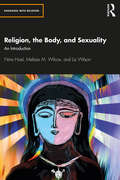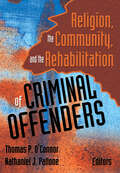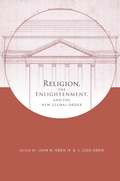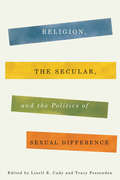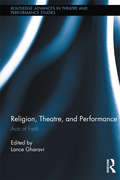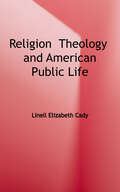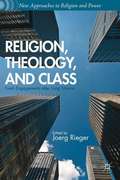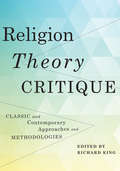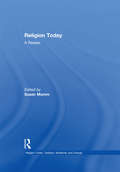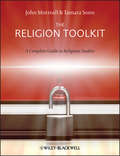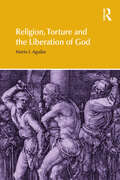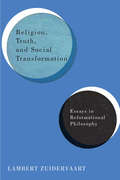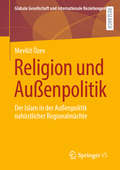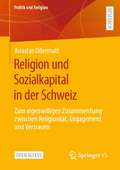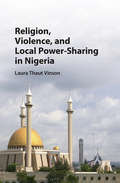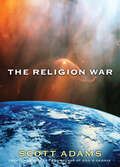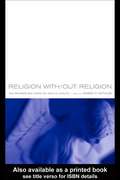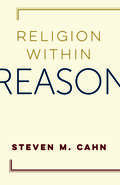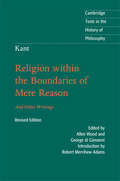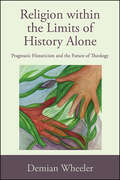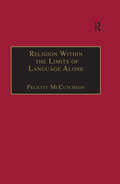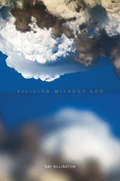- Table View
- List View
Religion, the Body, and Sexuality: An Introduction (Engaging with Religion)
by Nina Hoel Melissa M. Wilcox Liz WilsonHow does religion relate to bodies and sexualities? Many people would answer, simply, "through repression," but the relationship is much more complicated than that. While many religions draw boundaries between what they consider to be appropriate and inappropriate use of the human body, especially in the realm of sexuality, the same religions often celebrate human sexuality and even expect sexual partners to provide each other with sexual pleasure. Celibacy, too, is more than just repression, and sometimes it is even seen as providing the practitioner with great spiritual power; in other settings, the sex act itself is understood to provide this power. Religion, the Body, and Sexuality offers students and general readers a sophisticated and accessible exploration of the connections between religion, sexuality, and the body, through case studies and overviews in the following thematic chapters: Celibacy Regulation Controversy Violence Innovation Instrumentalization Ecstasy Each chapter includes suggestions for further reading, questions for further thought, and a list of relevant media resources. This engaging book is an excellent addition to introductory courses on religion or sexuality and is a much-needed new volume for advanced courses on the intersections of these areas of human experience.
Religion, the Community, and the Rehabilitation of Criminal Offenders
by Thomas P O'ConnorExplore the relationship between faith-based programs, religion, and offender rehabilitation! This book reports on current research from several disciplines to help the reader understand the nature and impact of the relationship between faith-based programs, religion, and offender rehabilitation. Religion, the Community, and the Rehabilitation of Criminal Offenders is a unique resource-there has been very little research published on this important topic. President Bush's faith-based initiative recognized that religion plays a role in the justice system and corrections that is overlooked but essential-it increases the role of community and caring in the system in a unique and important way. This pathbreaking book points the way toward a system of faith-based programs that are not only effective but also economical, as these programs are often staffed by volunteers. Religion, the Community, and the Rehabilitation of Criminal Offenders addresses important questions regarding the importance and effectiveness of faith-based rehabilitation programs, including: What is the relationship between prison religion and offender rehabilitation? What motivates inmates to become involved with religious programs and activities? What is the prison chaplain's role in rehabilitation? Are certain religious denominations more effective than others in preventing crime, delinquency, and recidivism? How does religious activity help inmates adjust to the prison environment? What do inmates have to say about the religious programs they encounter within the system? How did Islam develop within American correctional institutions and what changes has the movement gone through in recent years? Why do female African-American inmates tend to resist conversion to Islam while their male counterparts embrace the Muslim faith in increasing numbers? How can sacred texts and social theory be utilized as teaching tools and intervention strategies in the transformation processes of men incarcerated for violent crimes? (A fascinating study from the Sing-Sing prison) and more!
Religion, the Enlightenment, and the New Global Order (Columbia Series on Religion and Politics)
by J. Owen John Owen IvLargely due to the cultural and political shift of the Enlightenment, Western societies in the eighteenth century emerged from sectarian conflict and embraced a more religiously moderate path. In nine original essays, leading scholars ask whether exporting the Enlightenment solution is possible-or even desirable-today. Contributors begin by revisiting the Enlightenment's restructuring of the West, examining its ongoing encounters with Protestant and Catholic Christianity, Judaism, Islam, and Hinduism. While acknowledging the necessity of the Enlightenment emphasis on toleration and peaceful religious coexistence, these scholars nevertheless have grave misgivings about the Enlightenment's spiritually thin secularism. The authors ultimately upend both the claim that the West's experience offers a ready-made template for the world to follow and the belief that the West's achievements are to be ignored, despised, or discarded.
Religion, the Secular, and the Politics of Sexual Difference (Religion, Culture, and Public Life)
by Linell E. Cady Tracy FessendenGlobal struggles over women's roles, rights, and dress increasingly cast the secular and the religious in tense if not violent opposition. When advocates for equality speak in terms of rights and modern progress, or reactionaries ground their authority in religious and scriptural appeals, both tend to presume women's emancipation is ineluctably tied to secularization. Religion, the Secular, and the Politics of Sexual Difference upsets this certainty by drawing on diverse voices and traditions in studies that historicize, question, and test the implicit links between secularism and expanded freedoms for women. Rather than position secularism as the answer to conflicts over gender and sexuality, this volume shows both religion and the secular collaborate in creating the conditions that generate them.
Religion, Theatre, and Performance: Acts of Faith (Routledge Advances in Theatre & Performance Studies)
by Lance GharaviThe intersections of religion, politics, and performance form the loci of many of the most serious issues facing the world today, sites where some of the world’s most pressing and momentous events are contested and played out. That this circumstance warrants continued, thoughtful, and imaginative engagement from those within the fields of theatre and performance is one of the guiding principles of this volume. This collection features a diverse set of perspectives, written by some of the top scholars in the relevant fields, on the many modern intersections of religion with theatre and performance. Contributors argue that religion can no longer be conceived of as a cultural phenomenon that is safely sequestered in the "private sphere." It is instead an explicitly public force that stimulates and complicates public actions, and thus a crucial component of much performance. From mystic theologies of acting to the neuroscience of spirituality in rituals to the performance of secularism, these essays address a broad variety of religious traditions, sharing a common conception of religion as a crucial object of discourse—one that is formed by, and significantly formative of, performance.
Religion, Theology, and American Public Life (Suny Series In Religious Studies)
by Linell Elizabeth CadyIn this book, the author analyzes the role of religion and theology in American public life.
Religion, Theology, And Class
by Joerg RiegerThis important collection of essays addresses the question of why scholars can no longer do without class in religious studies and theology, and what we can learn from a renewed engagement with the topic. This volume discusses what new discourses regarding notions of gender, ethnicity, and race might add to developments on notions of class.
Religion, Theory, Critique: Classic and Contemporary Approaches and Methodologies
by Richard KingReligion, Theory, Critique is an essential tool for learning about theory and method in the study of religion. Leading experts engage with contemporary and classical theories as well as non-Western cultural contexts. Unlike other collections, this anthology emphasizes the dynamic relationship between "religion" as an object of study and different methodological approaches and openly addresses the question of the manifold ways in which "religion," "secular," and "culture" are imagined within different disciplinary horizons. This volume is the first textbook which seeks to engage discussion of classical approaches with contemporary cultural and critical theories.Contributors write on the influence of the natural sciences in the study of religion; the role of European Christianity in modeling theories of religion; religious experience and the interface with cognitive science; the structure and function of religious language; the social-scientific study of religion; ritual in religion; the phenomenology of religion; critical theory and religion; embodiment and religion; the impact of colonialism and modernity; theorizing religion in terms of race and ethnicity; links among religion, nationalism, and globalization; the interplay of gender, sex, and religion; and religion and the environment. Each chapter introduces the topic, identifies key theorists and issues, and respects the pluralistic nature of the scholarship in the field. Altogether, this collection scrutinizes the explicit and implicit assumptions theorists make about religion as an object of analysis.
Religion Today: A Reader (Religion Today: Tradition, Modernity and Change)
by Susan Mumm- Organized by themes which are central to understanding religion today - Suitable for advanced undergraduates: emphasis on controversy and debates in the field - International range of sources and religions - Includes popular as well as scholarly sources
The Religion Toolkit
by Tamara Sonn John MorreallThis complete overview of religious studies provides students with the essential knowledge and tools they need to explore and understand the nature of religion. Covers the early development of religion, with overviews of major and minor religions from Islam to ScientologyConsiders recent developments including secularization; the relationship between religion and science; and scientific studies on religion, health, and mystical experienceUses humor throughout, allowing students to remain open-minded to the subjectExplains what it means to study religion academically, and considers the impact of the study of religion on religion itselfContains numerous student-friendly features including photos, maps, time lines, side bars, historical profiles, and population distribution figuresProvides classroom users with a lively website,www.wiley.com/go/religiontoolkit, including questions, quizzes, extra material, and helpful primary and secondary sources
Religion, Torture and the Liberation of God (Religion and Violence)
by Mario I AguilarIf God can be used by the powerful to justify violence in the name of order, he can also be used by the weak to illuminate the position of the victims of political conflict. Religion, Torture and the Liberation of God explores the theological possibilities of a God who is a prisoner and a victim of torture. The book relocates God to the horrors of the military abuse of human rights in Chile and the systematic rape of women in the Democratic Republic of Congo. Aguilar argues that this theological exercise offers us new ways of understanding the abuse of power, whether it be the clerical abuse of children, violence against women, or homophobia. This examination of torture and rape becomes, through a theology of praxis and compliance, an examination of solidarity, love and affection. The book concludes with an exploration of the possibilities of a tortured God who liberates.
Religion, Truth, and Social Transformation: Essays in Reformational Philosophy
by Lambert ZuidervaartReformational philosophy rests on the ideas of nineteenth-century educator, church leader, and politician Abraham Kuyper, and it emerged in the early twentieth century among Reformed Protestant thinkers in the Netherlands. Combining comprehensive criticisms of Western philosophy with robust proposals for a just society, it calls on members of religious communities to transform harmful cultural practices, social institutions, and societal structures.<P><P> Well known for his work in aesthetics and critical theory, Lambert Zuidervaart is a leading figure in contemporary reformational philosophy. In Religion, Truth, and Social Transformation – the first of two volumes of original essays from the past thirty years – he forges new interpretations of art, politics, rationality, religion, science, and truth. In dialogue with modern and contemporary philosophers, among them Immanuel Kant, G.F.H Hegel, Martin Heidegger, Theodor Adorno, Jürgen Habermas, and reformational thinkers such as Herman Dooyeweerd, Dirk Vollenhoven, and Hendrik Hart, Zuidervaart explains and expands on reformational philosophy’s central themes. This interdisciplinary collection offers a normative critique of societal evil, a holistic and pluralist conception of truth, and a call for both religion and science to serve the common good. <P> Illustrating the connections between philosophy, religion, and culture, and daring to think outside the box, Religion, Truth, and Social Transformation gives a voice to hope in a climate of despair.
Religion und Außenpolitik: Der Islam in der Außenpolitik nahöstlicher Regionalmächte (Globale Gesellschaft und internationale Beziehungen)
by Mevlüt ÖzevWie beeinflusst Religion die internationale Politik? Diese Frage gewinnt zunehmend an Bedeutung, da vielerorts der Aufstieg religiöser Bewegungen und Parteien erkennbar ist. Mevlüt Özev untersucht dieses Phänomen anhand der machtpolitischen Rivalität zwischen dem Iran, Saudi-Arabien und der Türkei im Nahen Osten. Die nahöstlichen Regionalmächte nutzen den Islam als außenpolitisches Instrument und verfolgen dabei weitreichende Führungsambitionen. Der Autor zeigt, warum die Region anfällig für zwischenstaatliche Konflikte ist und wie ein Ausweg aus dieser Krise gefunden werden kann.
Religion und Sozialkapital in der Schweiz: Zum eigenwilligen Zusammenhang zwischen Religiosität, Engagement und Vertrauen (Politik und Religion)
by Anastas OdermattIn diesem Open-Access-Buch unterzieht Anastas Odermatt die weitverbreitete Annahme, dass sowohl Religion als auch freiwilliges Engagement förderlich für soziales Vertrauen und damit für gesellschaftlichen Zusammenhalt und Demokratie seien, einer empirischen Überprüfung. Wirkt Religion eher konflikthaft und negativ auf unsere Gesellschaft oder wirkt sie eher brückenbildend, stabilisierend und damit positiv? Diese Frage wird in Wissenschaft und Öffentlichkeit kontrovers diskutiert und unterschiedlich beantwortet. Basierend auf den Daten des KONID Survey 2019 für die Schweiz werden die Wirkmechanismen zwischen Religion und Religiosität, freiwilligem Engagement und sozialem Vertrauen in der Schweiz vertieft untersucht und allgemein verständlich erklärt. Dabei ergibt sich ein differenziertes Bild für die unterschiedlichen, teils eigenwilligen Zusammenhänge – neue Erkenntnisse und einige Überraschungen miteingeschlossen.
Religion, Violence, and Local Power-Sharing in Nigeria
by Vinson Laura ThautWhy does religion become a fault line of communal violence in some pluralistic countries and not others? Under what conditions will religious identity - as opposed to other salient ethnic cleavages - become the spark that ignites communal violence? Contemporary world politics since 9/11 is increasingly marked by intra-state communal clashes in which religious identity is the main fault line. Yet, violence erupts only in some religiously pluralistic countries, and only in some parts of those countries. This study argues that prominent theories in the study of civil conflict cannot adequately account for the variation in subnational identity-based violence. Examining this variation in the context of Nigeria's pluralistic north-central region, this book finds support for a new theory of power-sharing. It finds that communities are less likely to fall prey to a divisive narrative of religious difference where local leaders informally agreed to abide by an inclusive, local government power-sharing arrangement.
The Religion War
by Scott AdamsIn this frenetically paced sequel to Adams' best-selling "thought experiment," God's Debris, the smartest man in the world is on a mission to stop a cataclysmic war between Christian and Muslim forces and save civilization. The brilliantly crafted, thought-provoking fable raises questions about the nature of reality and just where our delusions are taking us.With publication of The Religion War, millions of long-time fans of Scott Adams' Dilbert cartoons and business bestsellers will have to admit that the literary world is a better place with Adams on the loose spreading new ideas and philosophical conundrums.Unlike God's Debris, which was principally a dialogue between its two main characters, The Religion War is set several decades in the future when the smartest man in the world steps between international leaders to prevent a catastrophic confrontation between Christianiy and Islam. The parallels between where we are today and where we could be in the near future are clear.According to Adams, The Religion War targets "bright readers with short attention spans-everyone from lazy students to busy book clubs." But while the book may be a three-hour read, it's packed with concepts that will be discussed long after, including a list of "Questions to Ponder in the Shower" that reinforce the story's purpose of highlighting the most important-yet most ignored-questions in the world.
Religion, War, and Ethics
by Gregory M. Reichberg Henrik Syse Nicole M. Hartwell Gregory M. Reichberg Henrik SyseReligion, War, and Ethics is a collection of primary sources from the world's major religions on the ethics of war. Each chapter brings together annotated texts - scriptural, theological, ethical, and legal - from a variety of historical periods that reflect each tradition's response to perennial questions about the nature of war: when, if ever, is recourse to arms morally justifiable? What moral constraints should apply to military conduct? Can a lasting earthly peace be achieved? Are there sacred reasons for waging war, and special rewards for those who do the fighting? The religions covered include Sunni and Shiite Islam; Judaism; Roman Catholic, Eastern Orthodox, and Protestant Christianity; Theravada Buddhism; East Asian religious traditions (Confucianism, Shinto, Japanese and Korean Buddhism); Hinduism; and Sikhism. Each section is compiled by a specialist, recognized within his or her respective religious tradition, who has also written a commentary on the historical and textual context of the passages selected.
Religion With/Out Religion: The Prayers and Tears of John D. Caputo
by James H. OlthuisWritten in response to John Caputo's The Prayers and Tears of Jacques Derrida, this work gathers together cutting-edge theologians and philosophers to examine the relationship between Derridan deconstruction and religion. Containing a lengthy counter-response by Caputo, as well as an interview, Religion With/Out Religion will be required reading for all those involved in contemporary theological debate.
Religion Within Reason
by Steven CahnIn the views of most believers and critics, religion is essentially connected to the existence of a supernatural deity. If supernaturalism is not reasonable, the argument goes, religion cannot be reasonable—or if supernaturalism is reasonable, religion must be as well. Are faith and reason, religion and science, doomed to a constant struggle for the heart of humanity? Steven M. Cahn believes that they are not, that even if God exists, religion may not be justified and that even if religion is justified, belief in God may not be.In Religion Within Reason, Cahn argues that the common understanding of the relationship between religion and supernaturalism is flawed and that while supernaturalism is not reasonable, religious commitment may well be. Writing not as a theist but as one who finds much to admire in a religious life, he examines faith and reason, miracles, heaven and hell, religious diversity, and the problem of evil, using a variety of examples taken from religious thought, literature, and popular culture. Lucidly written in a nonpolemical spirit, Religion Within Reason offers an exciting new approach to the reconciliation of science and religion.
Religion within the Boundaries of Mere Reason: And Other Writings
by Immanuel KantReligion within the Boundaries of Mere Reason, a work of major importance in the history of Western religious thought, represents a great philosopher's attempt to spell out the form and content of a type of religion that would be grounded in moral reason and would meet the needs of ethical life. This volume presents it, together with three short essays that illuminate it, in a new translation by Allen Wood and George di Giovanni, with an introduction by Robert Merrihew Adams that locates this essential essay in its historical and philosophical context.
Religion within the Boundaries of Mere Reason and other writings: And Other Writings (Cambridge Texts in the History of Philosophy)
by Immanuel Kant George Di Giovanni Allen WoodReligion within the Boundaries of Mere Reason is a key element of the system of philosophy which Kant introduced with his Critique of Pure Reason, and a work of major importance in the history of Western religious thought.<P><P> It represents a great philosopher's attempt to spell out the form and content of a type of religion that would be grounded in moral reason and would meet the needs of ethical life. It includes sharply critical and boldly constructive discussions on topics not often treated by philosophers, including such traditional theological concepts as original sin and the salvation or 'justification' of a sinner, and the idea of the proper role of a church.<P> This new edition includes slightly revised translations, a revised introduction with expanded discussion of certain key themes in the work, and up-to-date guidance on further reading. <P>Revised and updated to take into account new scholarship on Kant and on this key work. The translations are both accurate and readable, making this an ideal text for university courses. <P>Explores religious issues that are often overlooked by philosophers, discussing traditional theological concepts such as original sin.
Religion within the Limits of History Alone: Pragmatic Historicism and the Future of Theology
by Demian WheelerAmong the greatest challenges facing religious thinkers today is that created by historicism, the notion that human beings and their myriad understandings of reality are utterly historical, conditioned by contingent circumstances and tied to particular contexts. In this book, Demian Wheeler confronts the historicist challenge by delineating and defending a particular trajectory of historicist thought known as pragmatic historicism. Rooted in the German Enlightenment and fully developed within the early Chicago school of theology, pragmatic historicism is a predominantly American tradition that was philosophically nurtured by classical pragmatism and its intellectual siblings, naturalism and radical empiricism. Religion within the Limits of History Alone not only undertakes a detailed genealogy of this pragmatic historicist lineage but also sets forth a constructive program for contemporary theology by charting a path for its future development. Wheeler shows that pragmatic historicism is an underdeveloped resource for contemporary theology since it offers a model for normative religious thought that is theologically compelling yet wholly nonsupernaturalistic, deeply pluralistic, unflinchingly liberal, and radically historicist.
Religion Within the Limits of Language Alone: Wittgenstein on Philosophy and Religion (Heythrop Studies in Contemporary Philosophy, Religion and Theology)
by Felicity McCutcheonReligion Within the Limits of Language Alone provides a critical examination of the Wittgensteinian philosophers of religion who claim that the word 'God' cannot be understood as referring to a metaphysical being who may or may not exist. McCutcheon traces the arguments offered by these philosophers of religion back to Wittgenstein's own criticisms of speculative metaphysics, arguing that in its religious usage the concept of God does not fall under Wittgenstein's anti-metaphysical gaze. In presenting a detailed account of Wittgenstein's own philosophical method, including his criticisms of metaphysics, McCutcheon shows that it is possible to accept Wittgenstein's criticisms of metaphysics whilst retaining the metaphysical content of religious language. This book offers a fresh understanding of Wittgenstein's philosophical method and a new critique of religious discourse for those studying philosophy and religious studies.
Religion Without God
by Ray BillingtonThis criticism of theism, especially monotheism, questions the assumption that rejecting God means rejecting religion. Drawing on Western philosophical critiques of religion and non-theistic Eastern religions, Ray Billington shows how a religion without God could work.The concept of religion without God has informed not only the theories of Nietzsche, Kant and Spinoza, but also expressions of belief in Indian and Chinese religions-Hinduism, Theravada Buddhism Zen and Taoism. Concluding with a look at the "the future of faith," this is a wide ranging and lucidly-written look at what it means to "have faith" and how this is distinct from religious belief. Ray Billington is an experienced and respected author on Eastern religion and philosophy. His books include Understanding Eastern Philospophy, Living Philosophy and East of Existentialism, all published by Routledge. He also writes occasional journalism most notably as a contributor to The Guardian's 'Face to Faith' column. An ex-Methodist minister and onetime chaplain with the SAS, he has now retired from his post as Principal Lecturer in Philosophy at the University of the West of England.
Religion without God
by Ronald DworkinIn his last book, Ronald Dworkin addresses questions that men and women have asked through the ages: What is religion and what is God's place in it? What is death and what is immortality? Based on the 2011 Einstein Lectures, Religion without God is inspired by remarks Einstein made that if religion consists of awe toward mysteries which "manifest themselves in the highest wisdom and the most radiant beauty, and which our dull faculties can comprehend only in the most primitive forms," then, he, Einstein, was a religious person. Dworkin joins Einstein's sense of cosmic mystery and beauty to the claim that value is objective, independent of mind, and immanent in the world. He rejects the metaphysics of naturalism--that nothing is real except what can be studied by the natural sciences. Belief in God is one manifestation of this deeper worldview, but not the only one. The conviction that God underwrites value presupposes a prior commitment to the independent reality of that value--a commitment that is available to nonbelievers as well. So theists share a commitment with some atheists that is more fundamental than what divides them. Freedom of religion should flow not from a respect for belief in God but from the right to ethical independence. Dworkin hoped that this short book would contribute to rational conversation and the softening of religious fear and hatred. Religion without God is the work of a humanist who recognized both the possibilities and limitations of humanity.
